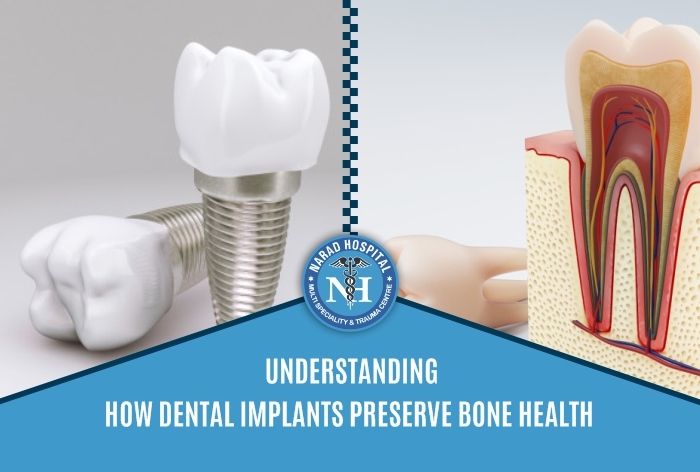Not so long ago, the most prominent dental implants for preserve bone health . But, studies suggest that the treatment has not been proven effective in curbing the bone loss. This pink set of teeth was a great option to effectively restore appearance and function until we found out that it does no good to regain bone density.
The primary cause for dentures becoming loose or unfit after sometime is their inability to provide stimulation that helps in the proper functioning and regeneration of jawbone.
Yet recent, but dental implants have been proven more effective in restoring function, appearance, and preventing bone loss. So, if you are unknown to dental implant treatment or you are just sceptical about the process and planning to undergo the procedure, here’s what you need to know about dental implants.
WHAT IS BONE LOSS?
Just like any other tissue of the body, the old bone cells die and get absorbed in the body. The process is known as resorption. Usually, the older cells get replaced with new and healthier cells. While chewing food, a force is generated which then travels through the teeth and encourages the growth of new teeth.
However, the stimulus ends when we lose our teeth ending in bone loss. Most of the dental experts believe that 25% of the jaw bone is lost within one year of tooth loss. As the jaw bone atrophies especially in the case of where the person has more than one tooth loss, the structure of the face starts changing. This loss of bone due to loss of teeth must be addressed as soon as it is observed to prevent further irreparable damage.
HOW DOES A DENTAL IMPLANT WORK?
Dental implants are often considered a fascinating invention of medical science. The process of dental implantation starts with creating a 3D image of your mouth using a mould and then a real replicate implant made out of titanium is fitted into your mouth wherever there is a tooth loss.
The entire process takes a period of 3 to 9 months depending on how quickly the crafted titanium fuses with the bone. Unlike many other dental procedures where the filling is carried out quite often, dental implants are permanent. Also, they bring several benefits along with them like you need to worry that they will get loose or pop out while you munch something or talk.
They are very natural and exert the same amount of force like your natural teeth while eating against your jawbone keeping them healthy to function properly.
CAN YOU STILL DO DENTAL IMPLANTS WHEN THERE IS SO MUCH BONE LOSS?
The patients planning for dental implantation ought to know that the procedure requires sufficient jawbone for successful treatment. So, all those suffering from long term tooth loss or worn out dentures may find it challenging to get the implantation right for them.
But there’s another optimal solution for all those with significant loss jawbone density that is bone grafting before undergoing dental implant . Bone grafts help to rebuild the portions of the jaw, resulting in an adequate bone density for supporting the successful dental implementation.
But there’s another optimal solution for all those with significant loss jawbone density that is bone grafting before undergoing dental implant . Bone grafts help to rebuild the portions of the jaw, resulting in an adequate bone density for supporting the successful dental implementation.
HOW DO DENTAL IMPLANTS PREVENT BONE LOSS?
Dental implants have become quite common, and most doctors recommend the treatment to replace the missing teeth and successfully prevent the loss of jawbone tissue. Unlike others, dental implants do not mimic the natural tooth root. Dental implants refer to the surgical placement of the titanium posts into the jawbone.
Thereafter, these dental implants attach to the dental restorations, including dental crowns, bridges, and dentures. For the successful accomplishment of the dental implant procedure, the process known as osseointegration must take place where the jawbone grows around the implant.
As known, the dental implant acts as the natural tooth root due to which the jawbone will again receive stimulation and will start responding by regenerating itself . The same process of stimulation will happen as it does with the natural teeth in the mouth, keeping the bone healthy and preventing bone loss.
DANGERS OF NOT ACTING FAST
The most prominent and initial sign of bone density loss is the missing tooth. It does not matter whether the tooth falls out on its own or due to an injury or accident, bone density determines how weak a tooth can become.
With the increasing loss of bone density, the teeth start becoming brittle, which marks the beginning of a destructive cycle in which the teeth start deteriorating slowly, and ultimately they fall out. You enter into the chronic oral deteriorated condition where you are unable to eat, chew, and even talk. So, we recommend that you don’t delay if you are suffering from such bone density loss as you may end in despair with an incurable condition.
Narad Hospital is considered a Dental Implant Hoshiarpur that has the specialization in the orthodontics field. We have an expert and proficient team of dentists and orthodontists who have performed a large number of successful dental implants.

